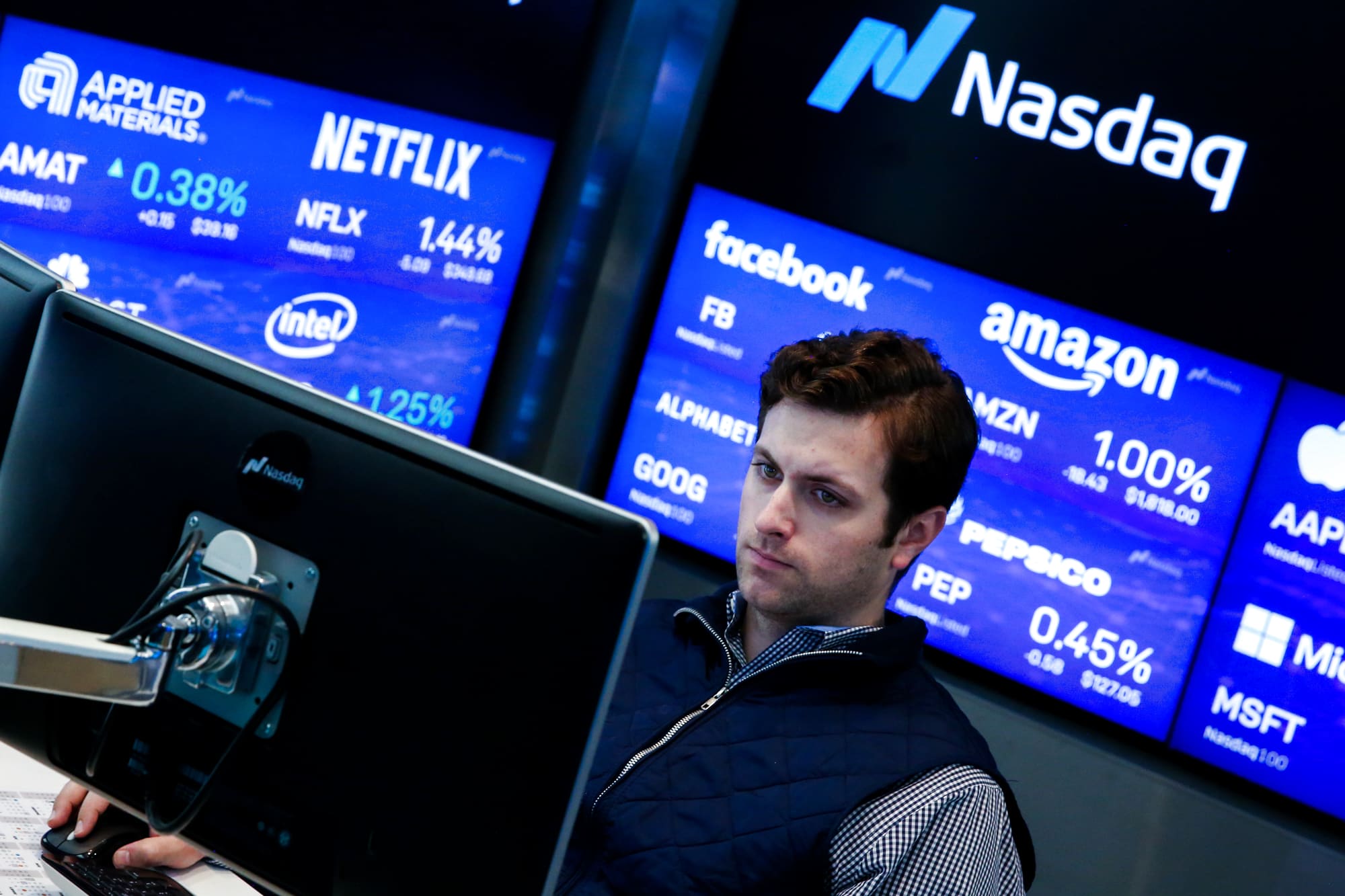FAANG stocks displayed at the Nasdaq.
Adam Jeffery | CNBC
Investors and traders have historically turned to less-risky assets such as U.S. Treasurys to weather market volatility and uncertainty. During the coronavirus pandemic, however, they have turned to unlikely place: tech and software stocks.
Shares of Apple, Netflix, Microsoft, and Amazon are all trading at, or near record highs. All four of these stocks are up at least 29% for 2020 and have contributed to the Nasdaq Composite‘s massive outperformance over the S&P 500 this year. The Nasdaq has surged 17% this year while the S&P 500 remains down over 2% in that time period.
Wall Street flocked into these names because they believe their business models can not only weather this downturn, but thrive in it. This has led major tech and software stocks to seemingly behave like a safe haven Treasury bond, a dynamic that was apparent throughout this week.
“Clearly, the Covid cases going up around the country has gotten people into those software and internet plays,” said Christian Fromhertz, CEO of Tribeca Trade Group. “These stocks are clearly the haves and it will stay that way until something changes.”
The U.S. reported record numbers this week in daily coronavirus increases. On Thursday, more than 63,000 new coronavirus cases were confirmed in the U.S., according to Johns Hopkins University. The country’s seven-day average of cases also jumped to more than 53,000 this week.
At the state level, Florida’s coronavirus-related hospitalizations hit an all-time high. Nevada rolled back a reopening plan for bars in the state.
This grim data put stocks that would benefit from the economy reopening under pressure this week. American Airlines fell more than 8% week to date and United slid nearly 10%. Gap shares dropped more than 3% in that time period.
Big Tech — once considered one of the riskiest groups in the stock market — shined this week. Microsoft climbed about 3% in that time period while Netflix and Amazon popped more than 10% to record levels. Apple also hit an all-time high, jumping about 5% for the week.
These stocks rose alongside the U.S. 10-year Treasury note. The 10-year yield started the week trading around 0.7%, but later fell to trade around 0.6% (yields move inversely to prices).
Investors argue that what makes these companies so attractive during this pandemic is their steady cash flows and recurring revenues at a time when clarity around the corporate earnings landscape is minimal.
“What these companies have going for them is that whole idea of a strong balance sheet and recurring revenue,” said Rebecca Felton, senior portfolio manager at Riverfront. “Recurring revenues, in this type of environment where cyclicals might fade out a bit, is really important.”
“It feels right to stick with quality and growth that you think you can count on,” Felton said.
Microsoft, Netflix and Amazon all have subscription-based services driving recurring revenue on a monthly or annual basis.
When the Fed forces interest rates to zero, they’re gonna push investors on the risk curve to get income and growth … If I’m going to be forced into equities, which is what the Fed’s clearly doing, I’m going to own the equities that I feel the best about and large-cap tech has become a safe-haven play.
David Spika
president of GuideStone Capital Management
Last quarter, Microsoft’s Office 365 users grew to more than 39 million from 37.2 million in the previous three-month period. Amazon, meanwhile, has more than 150 million paying Prime users. There are more than 180 million paying Netflix subscribers around the world.
Something else making some of these stocks attractive are high dividend yields relative to U.S. Treasurys.
According to FactSet, Apple and Microsoft currently yield 0.86% per share and 0.96%, respectively. The 10-year Treasury note, meanwhile, has a yield of around 0.6%.
To be sure, stocks are inherently riskier assets than Treasurys as they don’t have the backing of the U.S. government. Treasurys also give investors a consistent interest payment until they reach maturity, whereas stock dividends are subject to cuts or suspensions at any moment.
Tech stocks also face mounting regulation risk, which could put them under pressure. Chamath Palihapitiya, founder and CEO of investment firm Social Capital, thinks this — along with the possibility of higher taxes and new product experiences — make for a bearish case in Facebook and Google-parent Alphabet.
“Big Tech’s long term success is no longer about better products,” Palihapitiya said in a Friday tweet. “They are incumbents and their success is now a multi-variate/multi-dimensional problem of competition, anti-trust, tax and regulatory multiplied by EVERY city, state, country and jurisdiction in which the operate.”
Still, David Spika, president of GuideStone Capital Management, thinks using Big Tech as a safe-haven is prudent given how easy U.S. monetary policy is right now.
The Federal Reserve slashed rates to zero in March as part of an effort to support the economy during the pandemic. The U.S. central bank has also embarked on unprecedented monetary stimulus programs, including buying corporate debt.
“When the Fed forces interest rates to zero, they’re gonna push investors on the risk curve to get income and growth,” said Spika. “If I’m going to be forced into equities, which is what the Fed’s clearly doing, I’m going to own the equities that I feel the best about and large-cap tech has become a safe-haven play.”
Time will tell how long this will last and when Big Tech equities return to acting like stocks with individual risks.
Subscribe to CNBC PRO for exclusive insights and analysis, and live business day programming from around the world.
